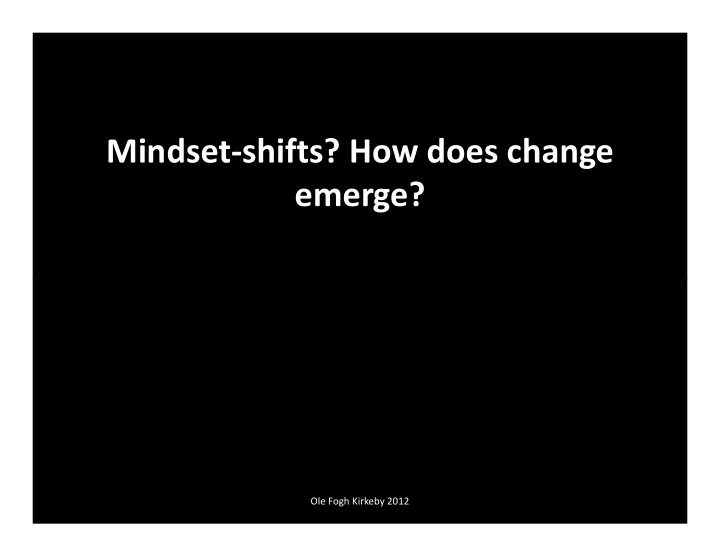

Mindset-shifts? How does change emerge? Ole Fogh Kirkeby 2012
Mindset-shifts Is a mindset a closed set of existential questions and answers at the common sense level? Questions: What is a human being? What is childhood? What is gender? What is childhood? What is gender? What is life? What is death? What is labor? What is age? What is nature? Answers? Who represents a mindset? Ole Fogh Kirkeby 2012
What is a mindset? Its components: Games of experience Language games Games of knowledge Games of truth Games of truth Are these universal or limited by history, culture and the level of knowledge? Ole Fogh Kirkeby 2012
Structure of mindsets Surface vs. underground Thought, discursive reason vs. Pre-reflective assumptions, beliefs, Bodily experiences, capacities, Emotions, mores Incorporated certainty, faith Deeply rooted normativity Anticipation of reflection How does all this emerge? Ole Fogh Kirkeby 2012
Is there a universal mindset? Is there one, true mindset? Does the universal mindset ” man ” exist beyond synchronical, cultural and religious differences, and beyond diachronical differences: Can we diachronical differences: Can we speak about a progressive development of mindsets, or even about a evolution of mind? From which position? Ole Fogh Kirkeby 2012
Ideologies of Intimate changes of mindsets : St. Augustine’s famous lines from his Confession III, caput 1 (“ Veni Karthaginem, et circumstrepebat me undique sartago flagitiosorum amorum”) sound, in E.B. Pusey’s translation: “To Carthage I came, where there sang all around me in my ears a cauldron of unholy loves. I loved not yet, yet I loved to love, and out of a deep-seated want, I hated myself for wanting not. I sought what I might love, in love with loving, and safety I hated, and a way without snares. For within me was a famine of that inward food, way without snares. For within me was a famine of that inward food, Thyself, my God; yet, through that famine I was not hungered; but was without all longing for incorruptible sustenance, not because filled therewith, but the more empty, the more I loathed it. For this cause my soul was sickly and full of sores, it miserably cast itself forth, desiring to be scraped by the touch of objects of sense.” Scholars now evaluate this as a genre piece, not as a new way of expressing sentiment and inner emotions. Ole Fogh Kirkeby 2012
Power and mindsets The protestants encouraged the publishing of Copernicus’ “ De revolutionibus orbium coelestium” in 1543, while the pope banned it. The heliocentric world view could heliocentric world view could obviously both negate and affirm the Bible. However it challenged the dogmas, and hence the power of the catholics. Ole Fogh Kirkeby 2012
The splendid varnish of capitalist greed closing the view to depths of misery The rebellious optics of the enlightenment only confirmed the rights of the bourgeois. Its result was an immense oppression of the lower classes, economically, politically and classes, economically, politically and culturally, plus imperialism. Political rights for all came 200 years after the enlightenment in the developed countries. Social rights have not come yet Ole Fogh Kirkeby 2012
The fatality of the consequential mindset-shift : The First World War produced an anti-armament, anti-war, pro-peace mindset in the English people and its politics. It gave Hitler the chance to mobilize and conquer Poland. mobilize and conquer Poland. Ethical mindset change does not guarantee anything. There is no logic of wisdom in history. Ole Fogh Kirkeby 2012
Does the Western world have a mindset at all? Response: If a mindset is a closed set of questions and answers, we have no mindset at the common sense level. We do not know what death is. We do not know the universe, neither its meaning, nor its mechanisms. We do neither agree about nature nor about the nature of man. nature nor about the nature of man. Most important: We do not share common conscious interests, though one could ascribe sustainability as a shared interest to everybody. The biggest problems: Ignorance, indifference, dogmatism and egoism. Ole Fogh Kirkeby 2012
Does the Western world have a common mindset? Response: We are atheists, Christians, Muslims, socialists, libertarians, vegetarians, greedy consumers, reckless exploiters of all available resources, available resources, environmentalists, imperialists, Buddhists, critical intellectuals, shareholders, drug addicts, analphabets, unemployed, … Ole Fogh Kirkeby 2012
The provoker of new mindsets The ultimate event and its stories: the crucifixion (religion) The catastrophe: Hiroschima The victory: Salamis (culture) The new technology (IT) The immigration (demography) The immigration (demography) The invasion (Hastings, culture) Totalitarianism (politics, culture) Scientific knowledge (climate) Ideologies: Humanism – sustainability ? Ole Fogh Kirkeby 2012
Recommend
More recommend